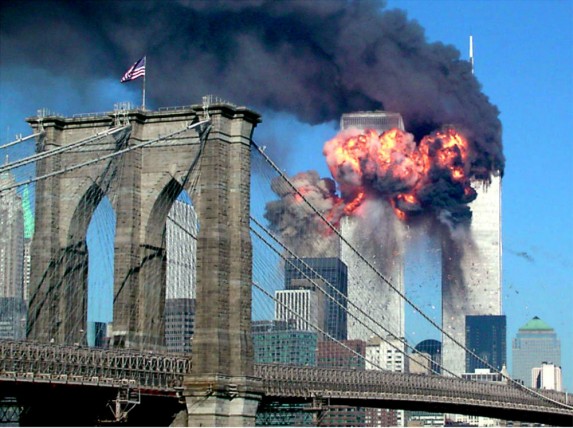Opinion: 14 years since 9/11 attacks, terrorism continues to hold mankind to ransom
In his first inauguration as the 32nd President of the United States of America, Franklin D. Roosevelt declared, “The greatest thing we have to fear, is fear itself.” And undeniably fear may well be the ultimate single human motivator.
In today’s world, however, irrational and ill-founded fear has unfortunately assumed prominence. It’s not global warming nor rampant human injustice, it’s not the oil mafia nor militarism – but it is terrorism and the fact that superpowers are being dared in a nonconformist way that has gripped billions of people world over.
The words ‘terrorism’, ‘terrorists’, ‘terror threat’, ‘linked to Taliban or al-Qaeda or Lashkar-e-Taiba’ etc. have been repeatedly splashed across millions of newspapers and magazines. But more than just these words, it is the ‘War on Terrorism’ that stares at all of us – and that too practically 24/7.
On September 11, 2001, when two aircrafts bombed the World Trade Center, American spirits crumbled into dust finer than that of the twin towers.

During a memorial service of the horrifying 9/11 attack, the words “One day our grandchildren will look back in time and ask how was the war on terror won? And we will tell them about the brave men and women who gave their lives so that we could live in freedom,” were spelt aloud.
A few might argue that a citizen’s support to the ongoing war on terrorism showcases the degree of their commitment to their country and mankind. But a graver question that faces us is – can this war on terrorism be used as a justification for holding mankind to ransom?
Following the 9/11 attack, US President George W. Bush said, “Our war on terror begins with al-Qaeda, but it does not end there. It will not end until every terrorist group of global reach has been found, stopped and defeated.”
14 years later, clearly the world has not championed the fight against terror. The unfortunate events of the Mumbai terror strike of 2008, the Boston bombings, the attempt to blast London airport, the everyday terror strikes in Pakistan, Afghanistan, Iran, and Iraq etc. indicate that threat to humanity remains.

The word terror itself induces pain and fear, and the human race today knows what terrorism does to a nation and its people. The criminal act of terrorism not only affects the immediate victim but also a larger audience who witness the brutality. Terrorist acts in the past have proved that attacks take place not only to spew venom through weapons, but to also cripple the political apparatus and a country’s economy. For instance, in 2008, 10 Pakistani terrorists attacked Mumbai, killing over 160 people. Indians, Israelis, Americans etc. were the immediate victims. But the actual target of those terrorists were the billions watching the coverage of the attack. Their actions led to a reaction and that itself proved the effectiveness of their terrorist act.
In India alone, over 200 odd districts have been plagued by several terrorist movements at varying intensities. With numerous active sleeping cells and with people from across the border still pushing ultras into the country, India continues to be affected by acts of terror. The latest Gurdaspur attack, the capture of Pakistani terrorist Naved stands testimony to the fact that war on terror is nowhere near its end.
Why do terror attacks take place?
A terror strike may be a deed of advocates of a cause or religion. It may also be carried out with an intention to influence political ideologies. At times, people who carry out such acts of crime are tricked to fight for a cause, but are actually just puppets in the hands of those fighting for money and supremacy. When smaller terror outfits carry out cowardly acts of crime, more often than not their aim is to spread fear and make others feel threatened. Regardless of the size of the terror outfit, the thirst for power and the quest for world dominance can be viewed as the root cause of terrorism. All this of course at the cost of abusing a nation’s political and economic authority.

Consequence of terrorism is catastrophic
Be it the rich or the poor, the elite or the aam aadmi – terrorist activities not only disrupt a country’s peace, but also disturb its people’s mind. Innocent lives go in vain. Dreams are shattered. Fear haunts livelihoods. Scars are left for life. Economic and social development comes to a standstill. Almost an entire nation becomes benumbed amid terrorist occurrences.
For developing countries, like India or Pakistan, an act of terrorism can prove to be fatal because the nation may not be equipped to withstand the impact of it – either economically or socially. Besides, a terrorist activity weakens political stability and makes it almost impossible for human rights to gain significance.
Ethics, morals, politics, economy, freedom etc. are murdered at the hands of terrorism. In countries like Pakistan, Afghanistan, Iraq etc. where terrorism is rampant, societies are destroyed and more so the will to bounce back loses its sheen. Mankind’s quest for peace collapses like a house of cards. Terrorism holds everything that they strive for to ransom!
Is there a solution?
It’s a known fact that terrorism and peace cannot coexist. Terror activities can come to an end only if global communities join hands to combat this menace. The world can win this war on terror only if the different cultures, religion, socio-economic backgrounds are willingly kept aside. But all of this looks like facets of an ideal world. Are we living in an ideal world? Of course not. If we did so, then mankind would have escaped the clutches of terrorism long time ago.
There obviously seems to be no short-term resolution to reducing terrorism. There are several reasons why terrorism is brewing in different nations, and eliminating each one of them evidently will be time-consuming. Similarly, countering the philosophy that promotes the use of violence in response to an apparent resentment will take a long time, given that there aren’t any events drastically altering the course of history.
Disclaimer: The opinions expressed in this article are the author’s own and do not reflect the views of Folomojo.com
Also read
Is reviving Sikh terrorism on ISI’s mind?
Karachi bleeds again: A look at 10 deadliest terror attacks on Pakistan soil in the last decade
‘Baby’ and 8 films that showcase India and terrorism

OMG-inducing, share-compelling, like-attracting, clutter-breaking, thought-provoking, myth-busting content from the country’s leading content curators. read on...
